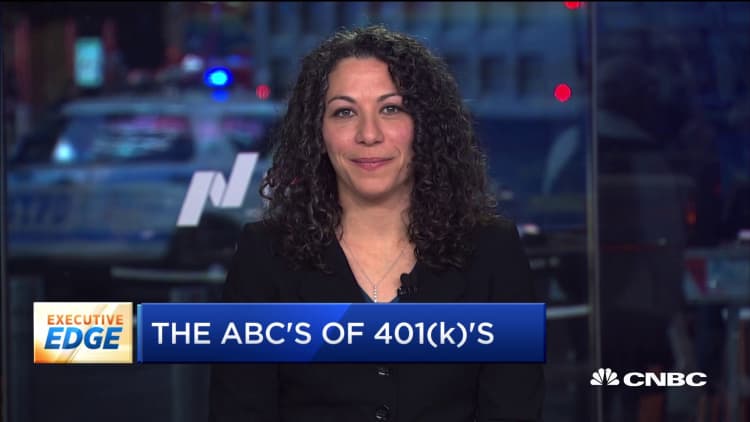A new retirement law could soon put annuities in front of more 401(k) investors — and some financial experts question whether that's a good thing.
The Secure Act, which President Donald Trump signed into law last month, eases rules for employers offering a 401(k) plan around how they choose an annuity provider.
Many business owners had been concerned that the old regime exposed them to too much legal risk. The Secure Act, the biggest overhaul to retirement law in more than a decade, strips away some of that worry for employers.
"It makes it more likely" that employers will offer annuities in their 401(k)s, said David Blanchett, head of retirement research at Morningstar Investment Management.

The basic function of an annuity is to provide investors a guaranteed stream of cash in their retirement years. Consumers hand over money to an insurance company, which agrees to immediately or years in the future pay consumers a recurring amount of monthly income for the rest of their lives.
The U.S. Social Security system is essentially a massive annuity program into which working Americans pay, in order to receive Social Security checks beginning as early as age 62.
Some financial experts say consumers should have enough annuity income (including that from Social Security) to cover fixed expenses like housing and transportation in retirement. However, annuities have gotten a bad reputation among many investors, due partly to purported high costs and complexity.
More from Personal Finance
Here's why you might not want to move all your IRA money to a Roth
Why you should consolidate those 401(k)s and IRAs
Don't fall prey to the stock market's banner year
Corporate America's gradual shift away from pension plans toward 401(k)-type plans has led some policymakers to advocate for the inclusion of annuities in more workplace savings programs. Pensions, like annuities, provide a guaranteed income stream to retirees, but 401(k) plans don't give such certainty.
Just 10% of 401(k) plans currently offer annuities to workers, according to the Plan Sponsor Council of America.
Philip Chao, principal and chief investment officer at Experiential Wealth, a Vienna, Virginia-based financial advice firm, thinks annuities "should be one of the [options] available in a retirement plan."
"But that doesn't mean everybody needs a piece of it," he said.
Employers have certain legal obligations to ensure the 401(k) investments they offer are in workers' best interests. Relative to annuity providers, employers must ensure insurance companies are financially strong and able to make annuity payments decades down the road.
Prior to the Secure Act, businesses were worried they could be held legally responsible in a lawsuit if an insurer were to go out of business and be unable to pay the promised income to investors.
More than 60% of businesses cited this risk as a reason they're not offering annuities, according to a survey conducted this year by consulting firm Willis Towers Watson.
The Secure Act extends legal protections to businesses that follow specific rules when selecting a 401(k) annuity provider. Essentially, employers are insulated from risk if the insurer they pick is in good standing with the state insurance department in which the insurer is based.
Barbara Roper, director of consumer protection at the Consumer Federation of America, thinks that standard is too flimsy and could create a "hell-scape" of poor, high-cost annuities and financially weaker insurers in 401(k) plans.
That scenario would probably play out most among small businesses, which generally don't devote the substantial resources that some large employers do to vet their 401(k) investments, Roper said.

Even if more 401(k) savers had annuities available, many would likely misuse or be confused by them, said Susan Shoemaker, a partner at Plante Moran Financial Advisors who's based in Southfield, Michigan.
"The problem for me is, annuities are complicated, and I don't think people understand what they're giving up for that guaranteed income," she said.
For example, investors who buy an annuity generally can't bequeath as large of an estate at death, since the insurance company often doesn't pay out remaining assets to heirs.
However, some observers believe the Secure Act rules could benefit consumers looking for annuity income — especially those employed by large businesses — since the offerings may be of lower cost than those available in the retail market.
And there are still other roadblocks that could dissuade employers from offering 401(k) annuities, including certain administrative issues. Plus, many business owners have structured their retirement plans with a view only to asset accumulation, and are loath to take more responsibility for workers' savings after they retire, according to some observers.
"The safe harbor rules are just a fire starter," Chao said.


